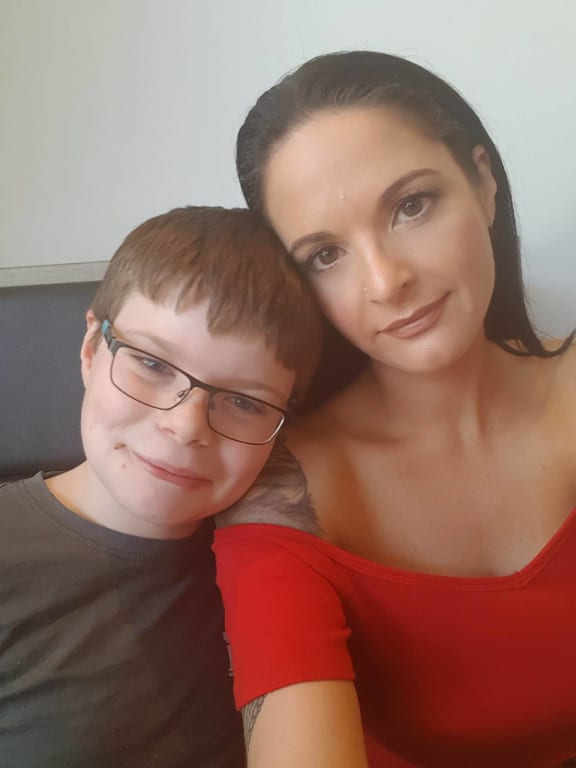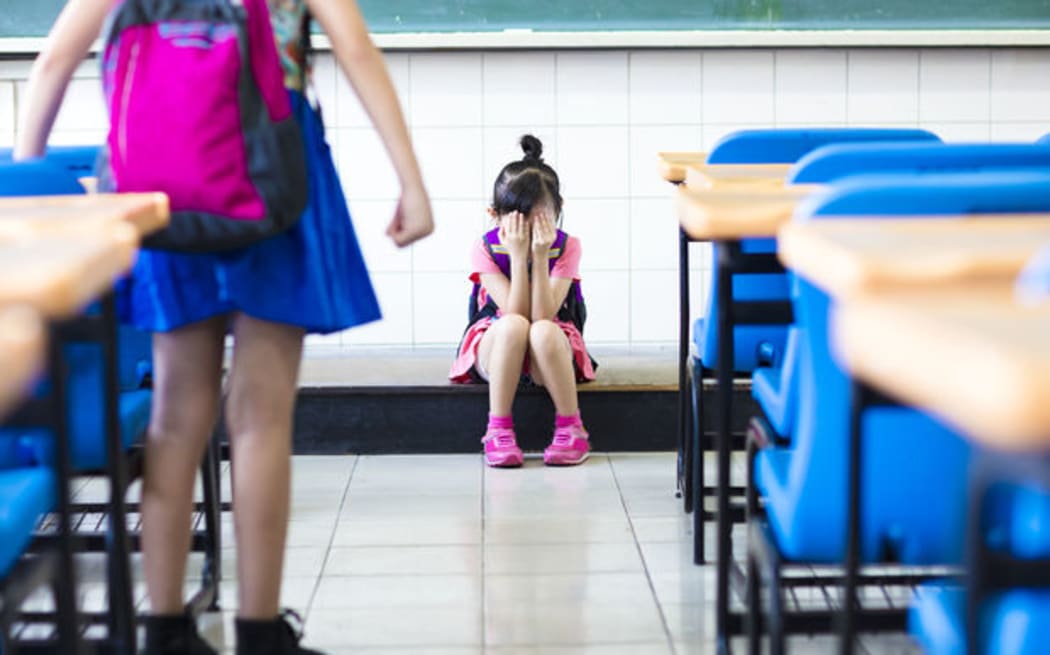Children with high needs, such as autism, are being denied a full and fair education due to a lack of specialised teacher training and resources, parents and educators say.
They are calling on the Ministry of Education to offer more support to mainstream schools so that they have the resources to not only manage children with high needs, but offer them the learning experience they deserve.
Christine Cosgrove is at her wits' end. Her son Christian has been suspended from school four times in five years, and she says he will be expelled if he's suspended once more.
The nine-year-old has high functioning autism and ADHD and receives just a couple of hours of teacher aide assistance per day. The year-four-student has sensory issues, so if it's too loud or busy he gets confused and upset. If he feels cornered, he will push, scream, hide or run.

Christine Cosgrove with her son Christian. Photo: SUPPLIED/ Christine Cosgrove
His mother fears no other school will accept him if he is expelled, and said it was through no fault of his own.
"He had an outburst with the teacher aide who got right in his face when he was escalated, and she did all the wrong things. They should all know what to do, how to be and how to diffuse the situation but they don't, and he gets punished for it,” the Christchurch woman said.
“I'm hearing so many stories now about children just like Christian that are ignored and left behind and are suffering in these schools. They're getting stood down, they're getting excluded, they're getting expelled, and then they've got nowhere to go."
Checkpoint with John Campbell has heard from more than 10 parents who said their children had been excluded from mainstream school or school activities due to behaviours associated with their disorders and disabilities, or because they were put in the too-hard-basket.
One child was removed from kapa haka group because they couldn't stand still or stop singing, another was asked to stay home because their teacher aide had resigned, and another wasn't even invited to school camp - even though the parents were willing and able to attend.
Ms Cosgrove is just one of many parents who said they were tired of battling the system.
"He thinks completely differently to a neuro-typical child and needs a different type of education and the problem is that's not being provided to children like Christian."
More specialist teachers were urgently needed to meet the needs of children like Christian, she said.
“We need schooling where we have specialised teachers or teachers that have training, specialised training in dealing with children that are different, like Christian, because it is completely different, they do have completely different educational needs, and their needs just aren’t been met and that’s why children are suffering and they’re crying for help, basically.”
His principal at Woodend School, Graeme Barber, would not comment on an individual student, but agreed with Ms Cosgrove's call for change.
He said there was a lot of planning and reviewing being done, “but not a lot of change”
"I think it was time there was action taken rather than just reviews."
There was nothing provided to schools to help them cope with children with high needs, such as autism, ADHD and foetal alcohol syndrome, he said.
Teachers were increasingly having to balance the needs of these children, while at the same time teaching another 30 or so students.
"The system itself needs to provide more resourcing, and time and specialised teachers to allow that, to allow schools to better meet the needs of all children, not just some of the children.
"Some of those children need teaching, specialised teaching, not just time from a teacher aide to manage their learning and keep them in schools, they need specialised teaching and that's missing."
Teachers gain a degree after training for three years, or post-graduate students can receive a diploma after one year of study.

Photo: 123RF
Autism New Zealand CEO Dane Dougan said they received very minimal training in working with children who have high needs, such as autism, and that was a major flaw in the system.
"The first step is to mandate some sort of autism training into the teacher's training college, because of the stats out now, you're looking at one in three classrooms are going to have a child with autism in their class.
“Secondly, there clearly needs to be more resource put into the system as well. It's all well and good to talk about inclusion, but having a child sitting at the back of the classroom, only engaging with the teacher aide, we don't really see that as inclusion, it's more a tick-the-box exercise."
Lisa Tatum studied between 1997 and 1999 and remembers doing a course on English for Speakers of Other Languages - known as ESOL - but nothing on children with special needs.
She is currently studying a Post Graduate Diploma in Specialist Teaching - autism spectrum disorder, while teaching at a Northland primary school. She said one specialist teacher per 400 children would be a good start - but one specialist teacher per autistic child would be ideal. Ms Tatum believes there will continue to be very little support if there isn't far better training.
"I think there needs to be a real clear pathway. It's not just a paper, this is special education, this is what you are going to find, because you need to really be very proactive when you are working with these children. They are difficult."
Parents are calling for the Ministry to inject more money and resources into education so their children aren't left behind, but also said the attitudes of some principals and teachers needed to change - a sentiment Ms Tatum agreed with.
"I've worked with teachers, good teachers, good friends, who have said 'I won't have that child in my class, I don't know how to deal with that child, I've done no training in special education, and I frankly don't want them in my class'. And these are people who are beautiful people and they're fantastic teachers, but they are absolutely, they don't want them in their class."
The Education Review Office found three quarters of schools in New Zealand demonstrated mostly inclusive practices - so a quarter of schools did not.
The Ministry of Education said in a statement that it was helping schools to become more inclusive in a number of ways, including by providing professional learning development and individual specialist support.
"Where the Ministry is informed about practices that are exclusive of students with disabilities they will follow up. A range of support is available to schools to assist them to be more inclusive.
“Updates to the Education Act provide more opportunities for the Ministry to intervene where they have significant concerns about a school. Interventions could include engaging specialist help or convening a case conference where there is disagreement between parents and a board of trustees. Because the case conference is a statutory process the resolutions are binding. If there is no agreement, the Ministry can adjudicate.”
It said there were 980 teachers who specialised in learning and behaviour, and were skilled to work with children with any additional needs. Nineteen teachers did the post graduate diploma in autism spectrum disorder last year, up from 18 in 2016 and 16 in 2015.
VIPS: Equity in Education spokeswoman Frian Wadia said her group, which advocates for better education for children with high needs and disabilities, had been asking the ministry for more support, including establishing an inclusion support team that visits schools and supports children who are being excluded.
“Ministry needs to start talking to the parents, and actually surveying parents and saying, you know, ‘do you feel included by your school, how many schools are engaging their parents and collaborating their parents and working in partnership with them’, because all of this is on paper and schools believe they are doing it, but parents don’t believe they are getting any of it.
“So you’ve got to start talking to the parents, Ministry needs to start talking to the parents and actually start collecting good data.”
The Ministry said it was working with the New Zealand School Trustees Association to introduce a Dispute Resolution Process which would help to manage and resolve any issues between schools and families of children with additional learning needs. Parents were also able to complain to the Ombudsman's office.
Dane Dougan said the ministry was working to diagnose children at an earlier age, and people were increasingly becoming aware of the needs of children on the autism spectrum.
"But I think at the end of the day right now there's a little bit of a head-in-the-sand mentality, that if it isn't a problem now, why should we bother solving it. Whereas we believe it is a problem and getting a bigger problem and something needs to be done about it."

